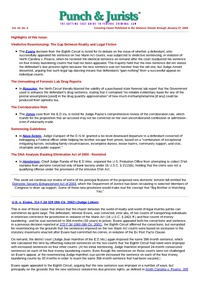The facts of this case read like a Hollywood movie script. The defendant, Adalberto Nava-Sotelo, attempted to help spring his older brother, Oswaldo Nava-Sotelo, from Federal custody at a dental clinic where he had just undergone oral surgery. While an enormous number of the facts about the escape were …
Here the Court blasted the validity of a purchased state forensic lab report used to enhance the defendant’s drug sentence, stating it contained “no reliable evidentiary basis for any of the pivotal assumptions [used] in the drug quantity approximation".
This is a significant case because it shatters another …
The defendant in this case was convicted of offenses related to cocaine base distribution. Both he and the Government appealed. The defendant contended that evidence of defendant's possession of marijuana was improperly admitted since it was irrelevant to the charge that he had distributed cocaine base; and he thus …
Here the majority held that the imposition of the same 396 month sentence following a successful appeal and resentencing was not a vidictive sentence within the meaning of North Carolina v. Pearce - a ruling that the dissent sharply ridiculed.
This is one of those cases that shows …
As a matter of first impression, misdemeanor offense for willful furnishing of false W-2 forms under 26 U.S.C. § 7204 does not preclude separate conviction under 26 U.S.C. § 7206(2) for aiding and abetting others in preparation of false tax returns.
Here the Court held, as a matter …
Here the Court held that the admission into evidence of proffer statements during rebuttal was not erroneous where, even though the defendant did not testify, his defense was inconsistent with statements made in the proffer.
The defendant, an accountant, was convicted of conspiracy to commit offenses against the …
Here the Court held that 21 U.S.C. § 841(b)(1)(D) provides the applicable statutory maximum sentence for offenses involving an indeterminate amount of marijuana - rather than the one year period specified in 21 U.S.C. § 841(b)(4).
Both the Government and the defendant filed appeals in this case. The …
A sentencing court may not depart downward to take a crime out of the definition of an aggravated felony in order to shield the defendant from the immigration consequences Congress has decided should follow from such crimes.
The defendant, a permanent resident alien, was convicted of violating 18 …
Here the Court held that although the quantity of drugs for which defendant was sentenced had not been
proven beyond a reasonable doubt, Apprendi does not apply to mandatory minimums.
In this case the Court held that although the quantity of drugs for which defendant was sentenced had …
The petitioner in this case, Lionel Gentry, was convicted of murder in Califirnia. After his conviction was affirmed by the state courts, he filed for a writ of habeas corpus in the Federal courts, pursuant to 28 U.S.C. § 2254, alleging that is counsel had been ineffective. He argued, …
Here the Court enjoined the Probation Office from attempting to collect DNA samples from a defendant convicted only of bank larceny, holding that the crime was not a qualifying offense under the provisions of the DNA Backlog Act.
Recently we have noted a number of cases that have …
The defendant in this case, Deborah Jones, an employee of the Richmond Police Department, was arrested for allegedly having taken part in a robbery with her ex-boyfriend. A lawful search incident to that arrest uncovered a gun concealed in her fanny pack, but no drugs or drug paraphernalia were …
